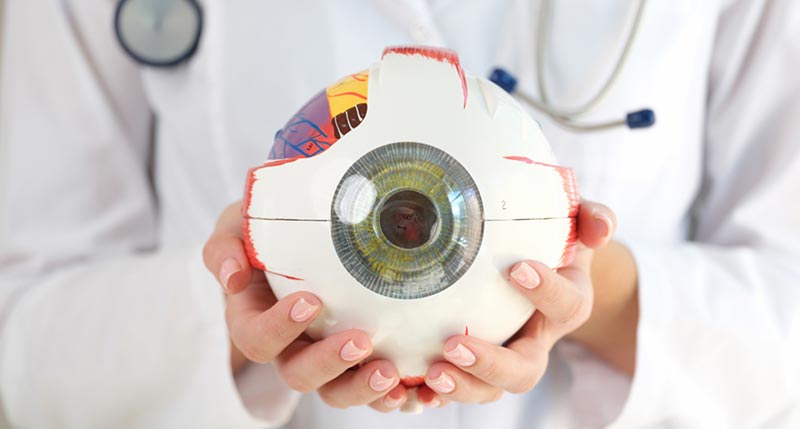The Significance of Routine Eye Exams: Insights From a Seasoned Ophthalmologist
Normal eye tests offer as a critical part of healthcare that prolongs past simple vision correction. A skilled eye medical professional can provide insights into just how these assessments not just detect typical eye conditions but likewise reveal underlying wellness issues that might otherwise go undetected.
Advantages of Routine Eye Tests
Although numerous people may forget the value of regular eye examinations, these assessments play an essential duty in maintaining general wellness and well-being. Normal eye examinations offer not just to assess vision however additionally to spot very early signs of systemic health and wellness concerns, including diabetic issues and high blood pressure. By determining these conditions at their inception, individuals can obtain timely interventions, significantly enhancing long-lasting end results.
Additionally, eye exams can help in monitoring existing wellness issues, guaranteeing that any type of adjustments in vision or eye health are promptly dealt with (optometrist). The assessments allow for customized referrals regarding glasses, lifestyle changes, and protective procedures against prospective eye pressure or damages
Beyond physical wellness, the benefits of regular eye exams expand to improving quality of life. Inevitably, focusing on eye exams cultivates an aggressive strategy to health and wellness management, encouraging individuals to take charge of their health.
Common Eye Conditions Detected
Normal eye examinations contribute in discovering a range of common eye problems that can substantially impact vision and general health. Amongst the most widespread problems identified throughout these evaluations are refractive mistakes, including nearsightedness (nearsightedness), hyperopia (farsightedness), and astigmatism. These problems typically show up as blurred vision and can be conveniently fixed with prescription glasses or call lenses.
Additionally, cataracts, which trigger clouding of the lens, are regularly identified in older grownups. This condition can bring about reduced vision and calls for surgical treatment for resolution. An additional typical issue is glaucoma, a group of eye conditions that harm the optic nerve, commonly linked to enhanced intraocular stress. Early discovery is essential as it can protect against irreversible vision loss.
Age-related macular degeneration (AMD) is another substantial condition that affects central vision, especially in individuals over 50. Lastly, diabetic retinopathy, a difficulty of diabetes, can result in serious vision disability otherwise checked on a regular basis. Via comprehensive eye examinations, these problems can be determined early, permitting prompt monitoring and therapy to maintain vision and boost top quality of life.
Importance of Very Early Discovery
Very early discovery of eye problems plays an essential duty in maintaining vision and protecting against considerable health difficulties. Lots of eye diseases, such as glaucoma, diabetic person retinopathy, and age-related macular degeneration, can advance silently without recognizable signs and symptoms in their onset. By the time signs show up, permanent damage might have happened, leading to irreversible vision loss.
Normal eye examinations assist in very early diagnosis, enabling prompt intervention and therapy. As an example, dealing with raised intraocular pressure can stop the onset of glaucoma, while taking care of blood glucose levels can substantially minimize the risk of diabetic person retinopathy. Additionally, problems like cataracts can be effectively taken care of with surgical treatment when recognized early.

How Often Should You Check Out?
Identifying the frequency of eye tests is essential for preserving ideal eye health and wellness and vision. The basic recommendation for adults is to have a detailed eye test each to two years, relying on individual risk elements and age. For individuals aged 18 to 60, an examination every 2 years is generally adequate if no vision issues are existing. Nonetheless, those over 60 need to take into consideration annual exams, as the risk of age-related conditions enhances substantially.
People with details risk factors, such as a family history of eye disease, diabetes, or existing vision troubles, may call for more frequent analyses. Youngsters ought to have their very first eye examination at 6 months old, followed by added examinations at age three and prior to entering school. Routine exams throughout childhood years are essential as vision can alter swiftly during developmental years.
Inevitably, the regularity of check outs should be customized to every person's scenarios, including way of living, work-related risks, and any pre-existing eye problems. Consulting with an eye care professional can supply this content individualized recommendations, making certain that your eye health and wellness is frequently monitored and preserved.
Tips for Your Eye Exam
Planning for your eye exam can boost the effectiveness of the see and make certain a thorough evaluation of your eye wellness. To maximize your time with the eye physician, it is crucial to gather pertinent details prior to your visit. Beginning by compiling a listing of any kind of drugs you are currently taking, including over-the-counter medications and supplements, as these can influence eye health.
In addition, record any kind of symptoms you have experienced, such as blurred vision, discomfort, or frustrations. This information will assist your eye doctor in diagnosing potential issues.
It is also helpful to have a family members background of eye problems at hand, as hereditary factors can add to your eye health. Ultimately, think about arranging your test temporarily when you are much less hurried, enabling you to ask concerns and discuss your concerns thoroughly. By preparing sufficiently, you make sure that your eye examination is efficient and that your ophthalmologist has all the essential details to give the most effective he said treatment possible.

Verdict
Routine eye exams play a crucial duty in keeping both vision and general health. They facilitate the very early detection of various eye problems and systemic problems, permitting prompt intervention. The recommendations for regularity highlight the significance of aggressive treatment. Implementing straightforward preparatory tips can boost the evaluation experience. Ultimately, focusing on detailed eye assessments contributes considerably to the preservation of vision and the improvement of top quality of life, highlighting the requirement of routine eye care in preventive healthcare strategies.
Regular eye examinations are critical in identifying a selection of typical eye conditions that can substantially impact vision and overall health and wellness.Establishing the frequency of eye exams is essential for preserving ideal eye wellness and vision.Preparing for your eye test can enhance the effectiveness sites of the check out and make sure a comprehensive examination of your eye health and wellness (optometrist). By preparing appropriately, you ensure that your eye exam is efficient and that your eye medical professional has all the needed details to supply the ideal care feasible
Eventually, prioritizing comprehensive eye analyses adds substantially to the preservation of vision and the enhancement of top quality of life, underlining the need of regular eye treatment in preventive healthcare approaches.